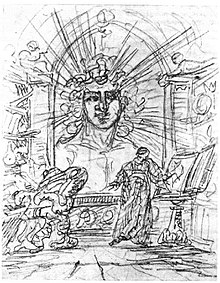
Erdgeist is the spirit of the Earth that Johann Wolfgang von Goethe describes in Faust, Part One. 'Du, Geist der Erde, bist mir näher; schon fühl ich meine Kräfte höher,...' Goethe depicts Erdgeist as a timeless being who endlessly weaves on the loom of time—both in life and in death. In this conception, Erdgeist is the means by which the immaterial manifests itself.
In the German language, Erdgeist literally means "earth spirit". In the context of German folklore, Erdgeist specifically refers to a gnome, the earth elemental mentioned by Paracelsus.
Erdgeist is also an 1895 play by Frank Wedekind, which was adapted into a 1923 film directed by Leopold Jessner.